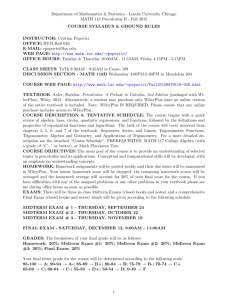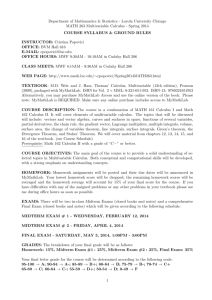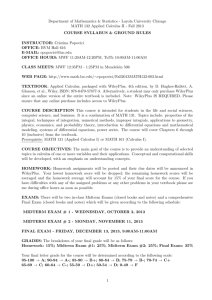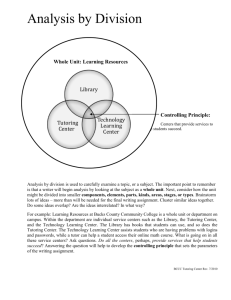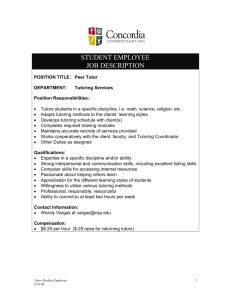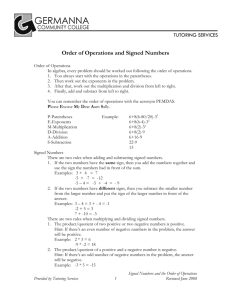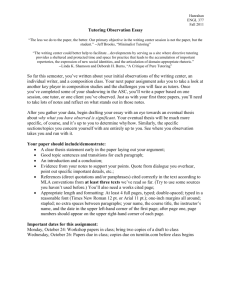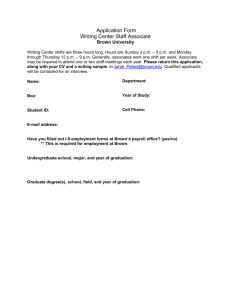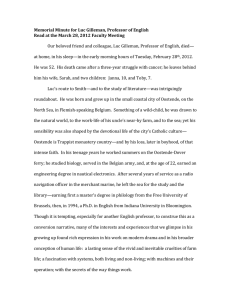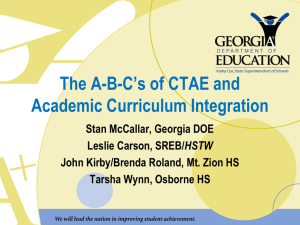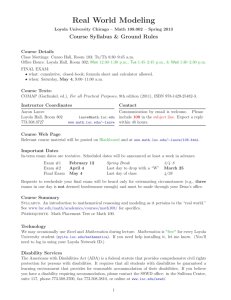Syllabus - Loyola University Chicago
advertisement
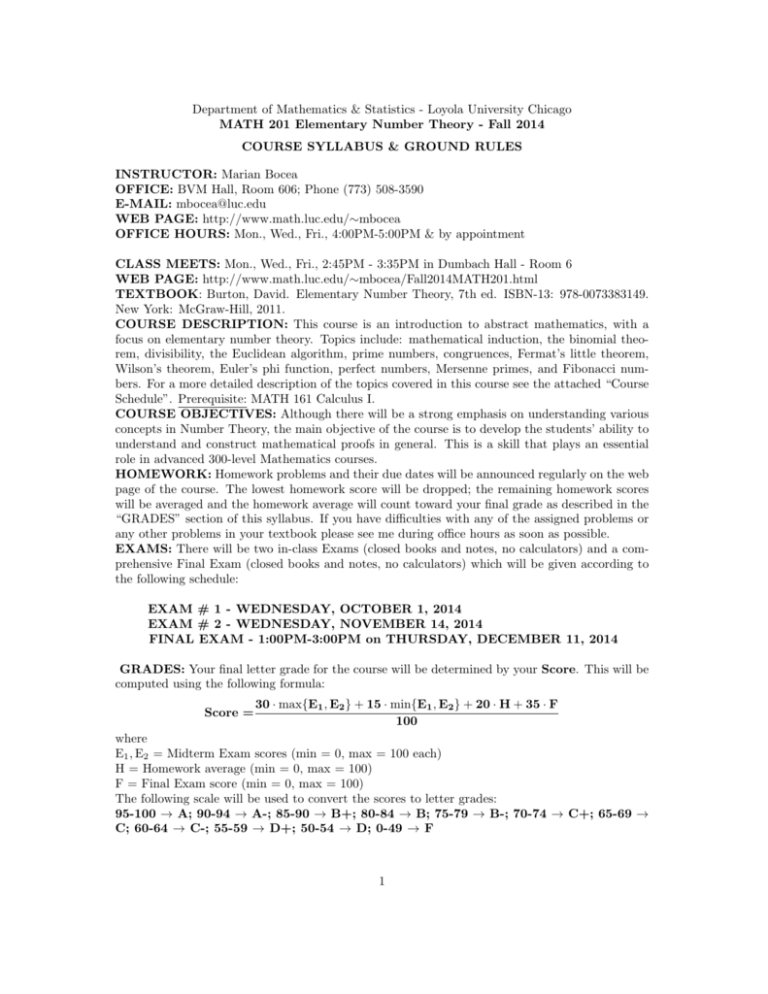
Department of Mathematics & Statistics - Loyola University Chicago
MATH 201 Elementary Number Theory - Fall 2014
COURSE SYLLABUS & GROUND RULES
INSTRUCTOR: Marian Bocea
OFFICE: BVM Hall, Room 606; Phone (773) 508-3590
E-MAIL: mbocea@luc.edu
WEB PAGE: http://www.math.luc.edu/∼mbocea
OFFICE HOURS: Mon., Wed., Fri., 4:00PM-5:00PM & by appointment
CLASS MEETS: Mon., Wed., Fri., 2:45PM - 3:35PM in Dumbach Hall - Room 6
WEB PAGE: http://www.math.luc.edu/∼mbocea/Fall2014MATH201.html
TEXTBOOK: Burton, David. Elementary Number Theory, 7th ed. ISBN-13: 978-0073383149.
New York: McGraw-Hill, 2011.
COURSE DESCRIPTION: This course is an introduction to abstract mathematics, with a
focus on elementary number theory. Topics include: mathematical induction, the binomial theorem, divisibility, the Euclidean algorithm, prime numbers, congruences, Fermat’s little theorem,
Wilson’s theorem, Euler’s phi function, perfect numbers, Mersenne primes, and Fibonacci numbers. For a more detailed description of the topics covered in this course see the attached “Course
Schedule”. Prerequisite: MATH 161 Calculus I.
COURSE OBJECTIVES: Although there will be a strong emphasis on understanding various
concepts in Number Theory, the main objective of the course is to develop the students’ ability to
understand and construct mathematical proofs in general. This is a skill that plays an essential
role in advanced 300-level Mathematics courses.
HOMEWORK: Homework problems and their due dates will be announced regularly on the web
page of the course. The lowest homework score will be dropped; the remaining homework scores
will be averaged and the homework average will count toward your final grade as described in the
“GRADES” section of this syllabus. If you have difficulties with any of the assigned problems or
any other problems in your textbook please see me during office hours as soon as possible.
EXAMS: There will be two in-class Exams (closed books and notes, no calculators) and a comprehensive Final Exam (closed books and notes, no calculators) which will be given according to
the following schedule:
EXAM # 1 - WEDNESDAY, OCTOBER 1, 2014
EXAM # 2 - WEDNESDAY, NOVEMBER 14, 2014
FINAL EXAM - 1:00PM-3:00PM on THURSDAY, DECEMBER 11, 2014
GRADES: Your final letter grade for the course will be determined by your Score. This will be
computed using the following formula:
Score =
30 · max{E1 , E2 } + 15 · min{E1 , E2 } + 20 · H + 35 · F
100
where
E1 , E2 = Midterm Exam scores (min = 0, max = 100 each)
H = Homework average (min = 0, max = 100)
F = Final Exam score (min = 0, max = 100)
The following scale will be used to convert the scores to letter grades:
95-100 → A; 90-94 → A-; 85-90 → B+; 80-84 → B; 75-79 → B-; 70-74 → C+; 65-69 →
C; 60-64 → C-; 55-59 → D+; 50-54 → D; 0-49 → F
1
TUTORING: The Center for Tutoring & Academic Excellence (CTAE) offers FREE tutoring
services to all LUC students. CTAE’s tutoring model includes small group tutoring and tutor-led
study halls. The small groups meet once per week throughout the whole semester and are led by a
trained peer tutor who has successfully completed study in the course material. Students are placed
into a group with other students who are taking that same course and who share the same professor.
Drop in Study Halls are offered throughout the week for many LUC courses and begin the first
week of classes. CTAE’s study hall schedule can be found online at: www.luc.edu/tutoring. To
learn more about CTAE’s services or to request small group tutoring, please visit the CTAE online
at www.luc.edu/tutoring or drop by the Center during normal business hours, Monday through
Friday, 9:00AM-7:00PM. CTAE is located in the Sullivan Center, 2nd floor, Room 245.
COURSE POLICIES
ACADEMIC INTEGRITY: All work in this course must be completed in a manner consistent
with the accepted standards of academic integrity. In particular, cheating during quizzes or exams
may result in the instructor assigning the grade of “F” and notification of the appropriate dean.
Cheating includes copying another student’s work, allowing another student to copy your work,
using unauthorized references, collaborating with another student, etc. The Code of Academic
Integrity will be enforced in all areas of the course. More information regarding the relevant
policies and procedures, including information about your rights and responsibilities as a student,
is available at http://www.luc.edu/academics/catalog/undergrad/reg academicintegrity.shtml
SPECIAL ACCOMMODATIONS: The Americans with Disabilities Act requires that reasonable
accommodations be provided for students with disabilities or other special needs. Students who
would like accommodations at the University need to contact the Coordinator of Services for
Students with Disabilities. For more information, please visit www.luc.edu/sswd/.
Students eligible for special accommodations are strongly encouraged to share their concerns or
requests with me at the beginning of the semester, or as soon as possible thereafter. I will be
happy to make appropriate arrangements.
CLASS ATTENDANCE: Class attendance is expected. You are solely responsible for missed
handouts or announcements made during lecture. If you cannot attend a particular lecture, make
sure that you stay informed regarding the information provided during that lecture.
HOMEWORK: You are allowed discuss the homework problems with your classmates. You may
form study groups to work on the homework problems or similar ones together. However, it is
important that you first attempt to solve the homework problems on your own, and that you only
hand in your own work.
EXAMS: The two exams and the final exam are to be written individually, any collaboration is
prohibited. Make-ups will be given only in case of a legitimate, documented excuse. If for some
reason you are not able to take a particular exam or quiz at the scheduled time, you are required
to inform me in advance.
FEEDBACK AND GRADING ACCURACY: I strongly encourage you to carefully review every
single graded homework assignment and exam to check for feedback and grading accuracy. I will
be happy to answer any questions that you might have regarding your graded work.
You are welcome to discuss with me any questions or concerns about the course during my office
hours or by appointment.
2
